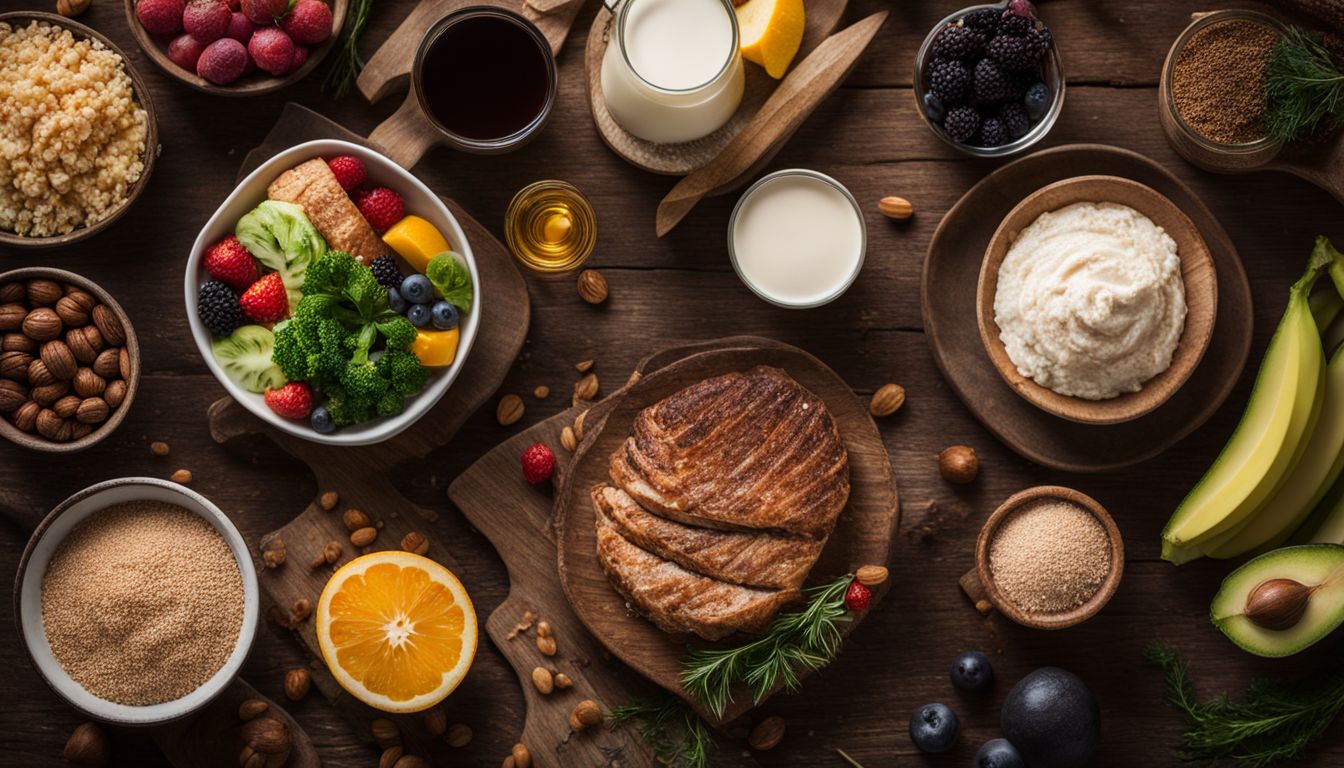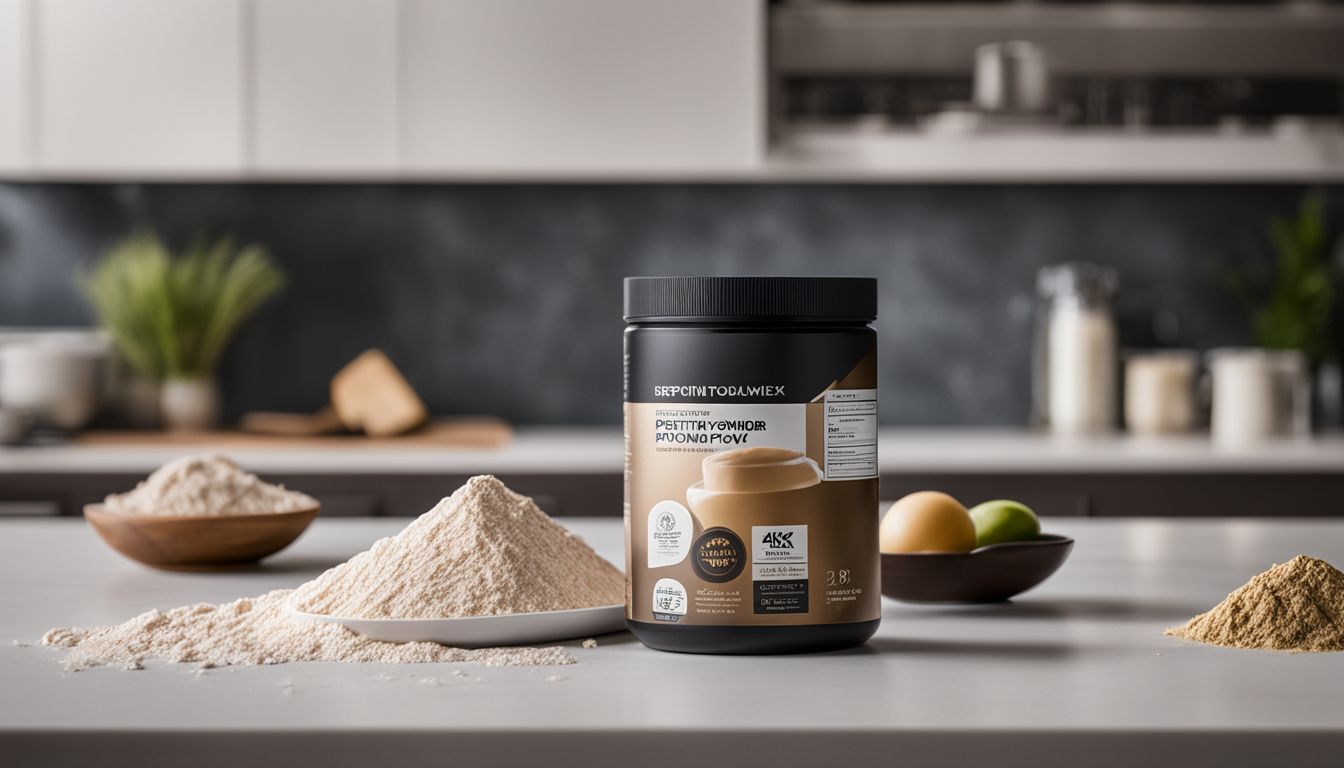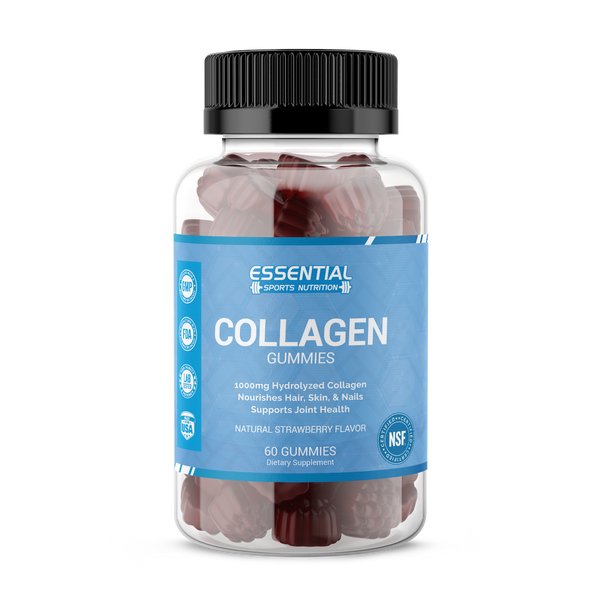Protein is key to a healthy diet, but it's easy to wonder if you're getting too much. Recent studies show that excessive protein intake could lead to health issues like kidney damage.
Our blog breaks down what you need to know about balancing your protein consumption for optimal health. Keep reading – we'll guide you through the facts without the confusion.

Key Takeaways
- Too much protein can lead to health issues like kidney damage, dehydration, and heart problems. It's important to not exceed 2 grams of protein per kilogram of body weight.
- Eating a variety of protein sources is key for good health. Choose low-fat dairy products, fish, nuts, beans, lean meats, eggs, quinoa, tofu, and plant-based burgers.
- Most adults need about 0.8 grams of protein per kilogram of body weight daily. Active adults and athletes may need more.
- Signs that you're eating too much protein include feeling tired often, having bad breath or digestive issues, and increased bathroom trips.
- Balance your diet by including other nutrients and stay hydrated to help process the protein you consume.
Understanding Protein

Understanding protein is essential for appreciating its critical role in maintaining health and well-being. This macronutrient serves as a building block for the body, fueling our cells and tissues with the necessary components for repair, growth, and optimal function.
The Role of Protein in the Body
Protein plays a key role in building and repairing our body's tissues. It helps make enzymes, hormones, and other chemicals needed for health. Muscles, skin, bones, and blood all need protein to grow and stay strong.
Every cell has protein inside it.
Eating enough protein helps prevent muscle loss as we get older. This is important because muscles help us move and keep our balance. Protein also assists with immune function, making sure the body can fight off illness effectively.
For good health, we need to eat foods with protein every day.
Sources of Protein
Protein is essential for human health. It plays a key role in building muscle, repairing tissue, and making enzymes and hormones. Here are various sources of protein:
- Meat: Beef, pork, lamb, and other red meats are rich in protein but can have high levels of saturated fat.
- Poultry: Chicken and turkey are good protein sources with less fat compared to red meat.
- Fish: Salmon, trout, and haddock provide protein and omega-3 fatty acids.
- Dairy Products: Milk, cheese, and Greek yogurt offer protein along with calcium for bone health.
- Eggs: A single egg contains about 6 grams of high-quality protein.
- Beans and Legumes: Black beans, lentils, and chickpeas are plant-based proteins that also give you fiber.
- Nuts and Seeds: Almonds, peanuts, flaxseeds, and pumpkin seeds contain protein plus healthy fats.
- Soy Products: Tofu, tempeh, and edamame are complete proteins from plant sources.
- Quinoa: This grain has more protein than most cereals and is full of amino acids.
- Vegetables: Spinach, broccoli, and potatoes have smaller amounts of protein but are healthy additions to meals.
Recommended Protein Intake

Determining the optimal amount of protein for your diet hinges on several factors, including age, gender, and level of physical activity. Health professionals base their guidance on a balance between what's necessary to maintain muscle mass and overall health without straying into excessive intake territories.
Daily Protein Requirement
Understanding the daily protein requirement is essential for maintaining a healthy body. The general consensus suggests that an average sedentary adult needs about 0.8 grams of protein per kilogram of body weight each day.
Here is a breakdown of the recommended protein intake in a table format:
| Individual Type | Daily Protein Requirement (grams per kilogram of body weight) |
|---|---|
| Sedentary Adult | 0.8 g/kg |
| Active Adult | 1.2 to 2.0 g/kg |
| Athletes | 1.4 to 2.0 g/kg |
| Older Adults | 1.0 to 1.2 g/kg |
| Pregnant and Breastfeeding Women | 1.1 to 1.5 g/kg |
| Individuals with Certain Medical Conditions | Varies based on medical advice |
It's important to adjust protein intake based on individual circumstances. Factors such as activity level, age, muscle mass, and overall health can influence protein needs. Exceeding 2 grams per kilogram of body weight is generally considered excessive and could lead to potential health risks.
Factors Affecting Protein Needs
Your body's need for protein depends on many things. Everyone is different, so your protein needs might not be the same as someone else's. Here are some factors that can change how much protein you need:
- Age: Young people and kids who are still growing need more protein to help their bodies develop. Older adults may need more to prevent muscle loss.
- Activity Level: People who exercise a lot, especially those doing strength training, might need extra protein for muscle repair and growth.
- Health Status: If you're recovering from an injury or surgery, your body may require more protein to heal. Someone with kidney disease has to be careful and not eat too much protein.
- Weight Goals: Those looking to lose weight might choose higher-protein diets to help control hunger and maintain muscle mass.
- Pregnancy: Women who are pregnant or breastfeeding need more protein to support their baby's development.
- Dietary Preferences: Vegans and vegetarians have to find different sources of protein since they don't eat meat. They must ensure they get enough from plant foods.
- Specific Conditions: Some health issues like sarcopenia, which is muscle loss due to aging, can increase your need for dietary protein.
The Impact of Too Much Protein

Overindulging in protein can backfire, leading to a range of potential health issues that challenge the notion of "more is better." Understanding the consequences of excessive protein intake is crucial for maintaining overall well-being and avoiding complications that could disrupt the body's intricate balance.
Indigestion and Dehydration
Eating too much protein can upset your stomach. You might feel bloated or have pain. Your body works hard to break down extra protein, and that can make you thirsty. If you don't drink enough water, dehydration kicks in.
You get tired and sometimes dizzy.
People on high-protein diets often forget to drink water. This leads to not having enough fluids in their bodies. High amounts of protein also push your kidneys to work overtime. This increases the risk for kidney stones, especially if you're not drinking plenty of water.
Potential Weight Gain
Protein can pack on pounds if you eat more than your body needs. Extra calories from any source, including protein, turn into fat when they aren't burned off. High-protein foods are sometimes high in calories, which leads to weight gain.
Lean meats and plant-based proteins might be healthier options.
Heavy intake of red and processed meats as part of a high-protein diet could harm your heart health. These kinds of meats often come with more saturated fat. They may raise the risk of heart disease linked to overweight and obesity issues.
It's important to choose your protein sources wisely for weight management and overall well-being.
Other Health Concerns
Eating too much protein can hurt your kidneys. Your body may struggle to get rid of waste, which can make your blood more acidic. This extra stress on your kidneys might lead to damage over time.
People with kidney issues need to be extra careful about how much protein they eat.
High amounts of protein in your diet could also mean you're not eating enough carbs or fats, which are important for energy and health. A diet heavy in red and processed meats, often high in saturated fat, raises heart disease risk.
Bone health can suffer too because a high-protein diet sometimes leads to lower bone mineral density and higher breakage risks.
The Myths on Protein Intake

Debunking common misconceptions, this section challenges popular beliefs about protein consumption and muscle development, exploring the facts behind when and how much protein should be eaten for optimal health.
Big Steak Equals Bigger Muscles: True or False?
Eating a big steak won't always mean you'll get bigger muscles. This is a myth many people believe. Your body can only use so much protein at once to repair and grow muscles. Any extra gets stored as fat or even works your kidneys harder, which isn't good.
A 2002 study shows that today's steaks are often over double what we should eat in one meal. The truth is, for muscle growth, balance is key: moderate amounts of protein with exercise and rest work best.
Eating too much in one sitting doesn't help more; it just adds unnecessary calories and stress on your body.
The Best Time to Consume Protein
Protein helps your muscles heal and grow, so it's key to have some after you work out. Within 30 minutes of finishing exercise, try to eat a snack or meal rich in protein. This timing helps your body the most when it’s ready to build muscle and recover.
Before you sleep, having protein can also be good for muscle repair. Overnight, while you rest, your body works on fixing and growing muscles. A bit of protein before bed can give it what it needs to do this job well.
Choose snacks like Greek yogurt or a handful of nuts that are easy on your stomach at night. For post-workout fueling, lean meats or a smoothie with whey powder work great. Just make sure not to overdo it – balance is still important for overall health!
The Science Behind Excessive Protein Intake

To truly understand the implications of too much protein, it is essential to delve into recent scientific studies that examine the effects of overconsumption on our health. Such research shines a light on how high-protein diets may influence everything from kidney function to bone density, providing crucial insights for informed dietary choices.
Research on Protein Overconsumption
Scientists have been looking at what happens when people eat too much protein. They found that eating a lot of protein for a long time can mess up the way our bones and calcium work together.
This research suggests we have to be careful with high-protein diets, especially those with lots of red and processed meats. These kinds of foods might make heart disease more likely.
Researchers also noticed that extra protein could make blood fats go up. This increase might lead to heart problems over time. People who keep their diets high in protein for many years might hurt their kidneys, which may cause chronic kidney disease (CKD).
The kind of protein you eat is important too because it affects your kidneys' health.
The Controversy of High Protein Diets
High protein diets spark debate among experts. Some argue that they're key for muscle building and weight loss. Others warn about the risks of heart disease from foods high in saturated fat allowed by many high-protein meal plans.
People with kidney problems need to be extra cautious, as too much protein can worsen their condition.
Research shows that loading up on protein beyond 2 grams per kilogram of body weight daily might lead to health troubles over time. Too much of this macronutrient has been linked to bone mass loss and renal issues when consumed long-term.
Health professionals continue to study the effects on healthy individuals, making high protein diets a hot topic in nutrition circles.
Signs of Excessive Protein Intake

Recognizing the signs of excessive protein intake is crucial as it can alert individuals to potential health issues before they escalate. These warning indicators are often subtle, manifesting in physical discomfort and changes in bodily functions that may prompt a reassessment of dietary habits.
Indications of Overconsumption
Eating too much protein can cause health problems. Watch for these signs to know if you're overdoing it:
- Bathroom trips increase: You may notice you're peeing more often.
- Swelling in your body: Parts of your body might get puffy, like your ankles or fingers.
- Digestive issues arise: Problems like diarrhea or constipation can show up.
- Breath smells bad: Your breath might have a strong, unpleasant smell.
- Feeling very tired: You may be more tired than usual, even if you rest.
- Getting thirsty often: Your body might feel dehydrated, making you want more water.
- Muscle and joint pain appear: You could have unexpected aches in muscles or joints.
- Weak bones develop: Over time, bones can get weaker and break easily.
Health Conditions Related to High Protein Diets
Eating lots of protein can be hard on your body. Your kidneys work extra to handle the high levels of protein which might lead to decreased kidney function over time. Some people may even face a higher risk of kidney stones.
Another concern is for your liver, which has to work harder to break down all that extra protein.
Bones can lose calcium with too much protein in your diet, making them weaker. You could also end up with heart problems because excess protein might raise blood lipid levels. This increase can lead to clogged arteries and heart disease.
It's important not just how much but what kind of proteins you eat for keeping your body healthy.
The Dangers of Protein Supplements

While protein supplements are often used to conveniently increase intake, overuse can lead to health risks that should not be overlooked. It's crucial for individuals relying on these products to understand the potential dangers and adhere to guidelines for safe consumption.
Risks Associated with Overuse
Taking too much protein can hurt your body. If you use too many protein powders, it might mess up the balance of nutrients you need. Your kidneys could get damaged and you might feel sick to your stomach or very thirsty.
These supplements are not safe for everyone to use all the time.
Having lots of extra protein in your diet can increase blood fat levels, which may harm your heart. It can also raise the chance of getting kidney stones, a painful health problem.
Always talk to a healthcare professional before taking more protein than what is recommended.
Tips for Safe Supplement Use
Protein supplements can help certain people who need extra protein. But it's vital to use them safely and wisely. Here are tips to help you:
- Stick to recommended servings. Read the label and use only the amount suggested.
- Choose high-quality products. Look for supplements that have been third-party tested for quality.
- Talk to your doctor first. Get advice if you have kidney issues, nutrient imbalances or other health concerns.
- Stay hydrated. Drinking enough water is important when you increase your protein intake.
- Don't replace meals. Use supplements as an addition, not a substitute for real food.
- Balance your diet. Eat a variety of foods to get all nutrients your body needs.
- Check for added sugars and fats. Some protein supplements may have extra calories from these ingredients.
- Pay attention to allergens. Avoid products with ingredients that can cause you harm if you're allergic.
- Monitor your health. Look out for signs of excessive protein like kidney problems and digestive issues.
Managing Protein Intake

Managing protein intake requires a balanced approach, understanding your body's needs while maintaining awareness of potential health risks. It involves choosing the right sources and quantities of protein to align with both fitness goals and overall wellness.
How to Keep Your Protein Intake in Balance
Keeping your protein intake balanced is important for your health. Here's how you can do it:
- Learn about the recommended dietary allowance (RDA) for protein. This number depends on your weight and activity level.
- Eat a variety of foods to get your protein. Include both animal and plant-based sources in your diet.
- Spread out your protein consumption throughout the day. Have some at breakfast, lunch, and dinner.
- Listen to your body's hunger and fullness cues. They can help you avoid overeating protein.
- Monitor portion sizes of high - protein foods. Stick to the serving sizes suggested on nutrition labels or by health guidelines.
- Combine proteins with fiber - rich foods. This helps with digestion and appetite control.
- Stay hydrated, especially if you eat a lot of protein. Water helps process protein in your body.
- Regularly check in with a healthcare provider about your diet. They can offer advice based on your specific needs.
- Limit the use of protein supplements if possible. Try to get most of your protein from whole foods instead.
- Keep an eye out for signs of excessive intake like indigestion or feeling thirsty often.
Healthier Sources of Protein
Protein is a key part of any diet. It helps your body repair cells and make new ones. Here are some great sources of protein that you can include in your meals:
- Low-fat dairy products: These give you protein without too much fat. Things like yogurt, milk, and cheese are good options.
- Fish: It's high in protein and has other good stuff like omega-3 fatty acids. Salmon, tuna, and trout are some healthy choices.
- Nuts and beans: They offer protein along with fiber. Almonds, lentils, chickpeas, and black beans are both tasty and nutritious.
- Lean chicken and turkey: They have lots of protein but not as much fat as red meat does.
- Eggs: A super source of protein that can be cooked in many different ways.
- Quinoa: This grain is full of protein and also has all the essential amino acids your body needs.
- Tofu and soy products: These are great for people who don't eat meat. They give you plenty of protein without the fat that comes with meat.
- Plant-based burgers: These can be a good choice if they're made with whole ingredients like beans or peas.
Conclusion

Protein is an essential macronutrient that supports growth, maintenance, and repair of tissues throughout the body. However, consuming protein in excess of our needs can lead to potential health issues like kidney strain, constipation, and increased risk of heart disease. Finding the optimal amount of daily protein through a balanced diet can help people stay healthy and strong while avoiding possible problems from overconsumption.
Eating a variety of lean protein foods like fish, poultry, legumes, nuts and low-fat dairy in moderate portions can help provide adequate amounts of protein for most people. Monitoring your overall diet, activity level, and individual needs will allow you to determine the right protein intake to support your health goals without exceeding recommended amounts.
Daily Protein Requirements FAQs
Q: How much protein do I really need every day?
A: Your daily protein requirements depend on factors like age, gender, and activity level; however, most people benefit from moderate amounts aligned with established protein recommendations.
Q: How much protein do you need per day?
A: The general recommendation is to consume 0.8 grams of protein per kilogram of body weight. However, this can vary based on individual factors such as activity level, age, and overall health.
Q: Can you eat too much protein?
A: Yes, consuming excessively high levels of protein can put strain on the kidneys and may lead to potential health issues. It's important to maintain a balanced and moderate intake of protein.
Q: What are the health effects of consuming too much protein?
A: Overconsumption of protein can potentially lead to kidney problems, dehydration, and an increased risk of calcium loss in the bones. It's important to maintain a careful balance in protein intake for overall health.
Q: How can I ensure I get enough protein in my diet?
A: You can ensure sufficient protein intake by incorporating a variety of protein sources such as lean meats, poultry, fish, dairy, eggs, legumes, and plant-based protein options into your meals. It's also important to include protein-rich snacks in your diet.
Q: Is a high protein diet beneficial for building muscle mass?
A: Yes, higher protein intake can support muscle growth and repair. It is often recommended for individuals engaged in resistance training or seeking to increase muscle mass, but it's essential to maintain a balanced diet overall.
Q: What are common sources of protein?
A: Protein sources include lean meats, poultry, fish, dairy products, eggs, legumes (such as beans and lentils), tofu, tempeh, and certain whole grains like quinoa and bulgur. Protein can also be obtained from nuts and seeds.
Q: How much protein is too much?
A: While protein needs vary based on individual factors, excessively high protein intake is generally considered to be above 2 grams per kilogram of body weight. It's essential to consult with a healthcare professional for personalized guidance.
Q: What are the recommended protein requirements for active individuals?
A: Individuals engaged in regular physical activity or intense exercise may benefit from a slightly higher protein intake, typically ranging from 1.2 to 2.0 grams per kilogram of body weight to support muscle maintenance and repair.
Q: How can I increase protein in my diet?
A: You can increase protein intake by incorporating protein-rich foods such as Greek yogurt, cottage cheese, nuts, seeds, and lean meats into your meals. Additionally, using protein supplements or protein-fortified products can help boost daily protein consumption.
Q: Is it possible to meet daily protein needs without consuming animal products?
A: Yes, it's entirely possible to meet daily protein needs through a plant-based diet by including sources such as legumes, tofu, tempeh, seitan, quinoa, chia seeds, and plant-based protein powders. It's important to ensure a variety of plant-based protein sources for optimal nutrition.
Q: What can happen if I eat too much protein?
A. Eating an excessive amount of protein over time might strain your digestive system and could lead to health issues such as chronic diseases or a decrease in kidney function measured by the glomerular filtration rate (GFR).
Q: Can high-protein diets help me lose fat?
A. Yes, higher protein diets can enhance satiety and may support fat loss when coupled with a low-calorie intake but should be approached carefully to avoid negative health impacts.
Q: Is it true that older adults need more protein?
A. Older adults might require more protein to prevent age-related muscle loss; it is essential to consult medical review for individualized advice.
Q: Should my diet focus solely on proteins for weight-loss benefits?
A. No single macronutrient should dominate your diet; balance among proteins, fats, carbohydrates along with plant-based elements constitutes the healthiest diet approach ensuring well-rounded nutrition while pursuing weight loss goals.























